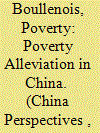| Srl | Item |
| 1 |
ID:
187937


|
|
|
|
|
| Summary/Abstract |
Soon after China reportedly achieved the goal of poverty alleviation in most regions ahead of schedule, a campaign of "follow-up check" of the deviations in policy implementation became a key task for local governments from 2019 to 2020. A case study of town H in province M during the "follow-up check" period revealed that local governments at various levels enjoy different authorities in goal setting, inspection, and incentive provision. However, the campaign-styled "follow-up checks" cannot meaningfully overcome the problem of inefficient governance. As the work of poverty alleviation comes to an end, local governments are under time pressure to solve protracted problems, uncertain about whether the higher-level government over them will exercise its authority in inspection and job acceptance. Local governments tend to displace the original goal with new and additional work targets to ensure successful acceptance of their jobs by the upper-level government. This study observes the practice of "follow-up checks" of poverty alleviation and provides an explanation for different governmental behavior taken in campaign-styled governance.
|
|
|
|
|
|
|
|
|
|
|
|
|
|
|
|
| 2 |
ID:
174508


|
|
|
|
|
| Summary/Abstract |
Since taking office, president Xi Jinping’s government has granted massive funding to what has become China’s strongest poverty-reduction campaign ever. Based on the study of detailed budgets in eight rural counties, as well as ethnographic and interview data in a ninth county, this article explores how poverty alleviation programs shape the distribution of power and resources in rural China. It argues that poverty alleviation in rural China predominately focuses on infrastructure investment and support to the local economy, rather than on social insurance, education, and household subsidies. Support to local companies, the article argues, entails co-opting established enterprises, rather than supporting new entrepreneurship among poor households. Overall, the Chinese approach to rural poverty alleviation highlights the emergence of a state-sponsored corporate paternalism that strengthens local hierarchies of wealth and power.
|
|
|
|
|
|
|
|
|
|
|
|
|
|
|
|